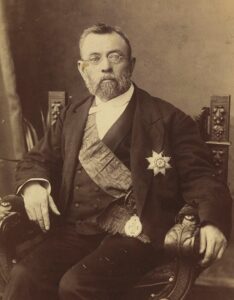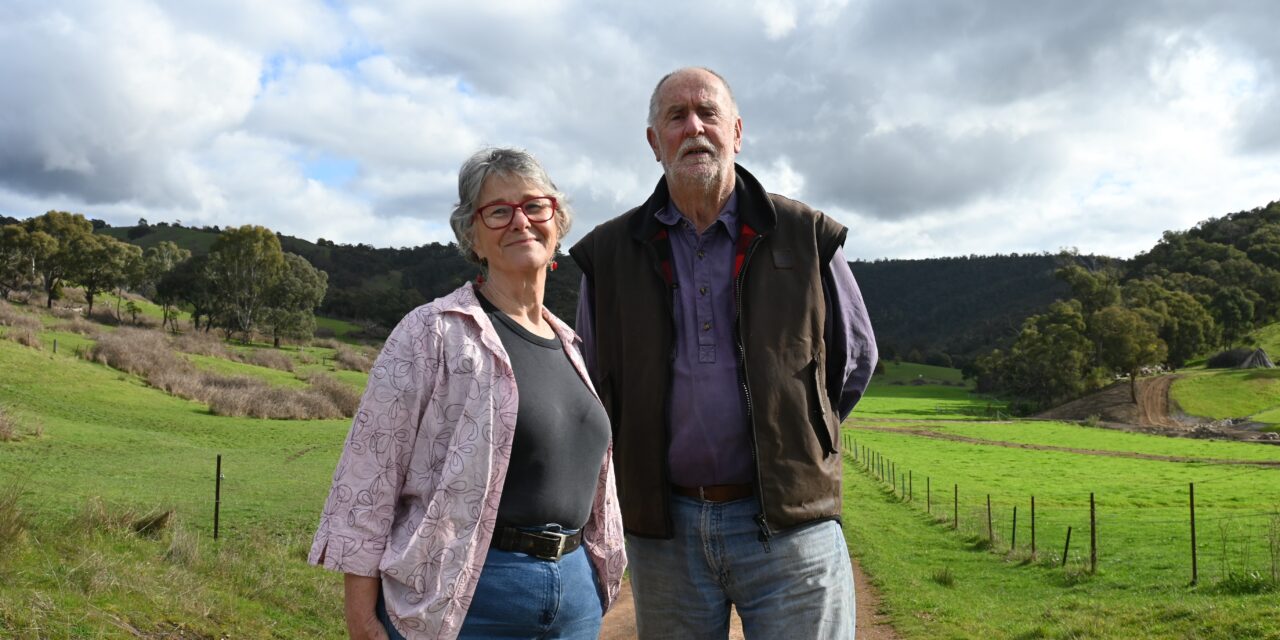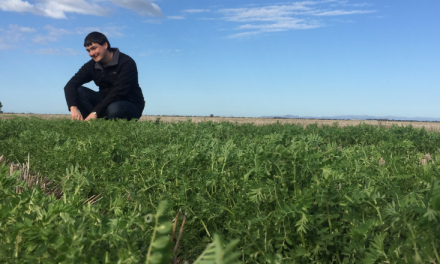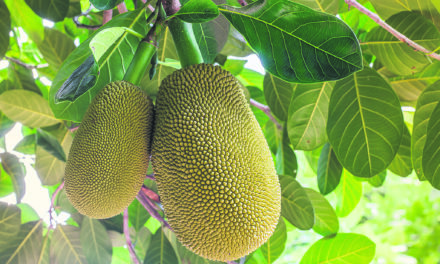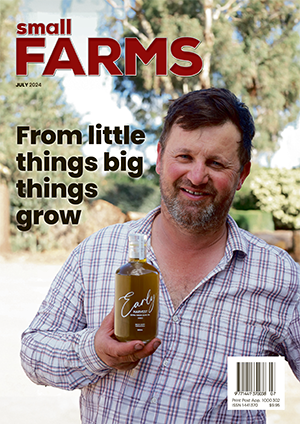Any battle needs a good map room and the fight taken up by the locals of the Upper King Parrot Creek Valley to control blackberries has a headquarters, and a plan of attack, that is more than well under way, as ANDY WILSON discovered.
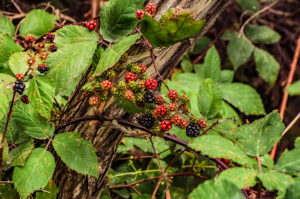
That map details the success of this small Victorian community’s efforts in controlling the invasive plant.
Land already conquered includes the view upstream from Upper King Parrot Rd, an area which has long had its blackberries removed and fences repaired to keep cattle from the precious riparian zone.
That section of river is now a thriving forest of black wattle.
The battle plan map is kept sprawled on the dining table of Flowerdale grazier Terry Hubbard, a decorated environmental action man who has been a part of the local strategy to control blackberries in the ‘Valley of a Thousand Hills’.
Terry was awarded an OAM in 2016 for his contribution to environmental and community engagement and has chaired Landcare networks from the national level down.
Dr Susan King also plays a part in the 30-year project, pointing out the colour-coded stickers on the map which indicate residents in the valley who are either signed up, controlling blackberries on their own or else not giving the invasive plant the attention it deserves.
Susan is no deputy to Terry, holding her own as president of Strath Creek Landcare and secretary of the Upper Goulburn Landcare Network, and has co-ordinated extensive revegetation projects in the area.
So, it’s two field marshals, side by side, conquering one of the country’s most invasive and destructive weeds, and even calling on some heavy armour when needed.
“We co-ordinate helicopter movements for spraying and are providing chemical subsidies.
“By and large these signed-up people have remained faithful to the cause and the helicopter won’t come for one party but would come down and do them all in one fell swoop; it needs co-ordinating.”
Despite the map showing great success, which an afternoon tour among the now blackberry-free pastures demonstrated, non-compliant locals still attract the ire of those who have played their part in keeping the weed under control.
“It’s a key issue and we have not been able to take some people on board,” Terry said.
“This is what disheartens any neighbour on one side of a boundary.”
A road divides two nearby properties, for instance — one of which is clearly invaded, robbing the grazing calves of about 20 per cent of their pasture.
“The Victorian Blackberry Taskforce (VBT) has a formula where if you tell them what percentage of your land is blackberries, they will tell you how much money you’ll be losing.”
Terry sweeps his hand across a view which illustrates the productivity gained when blackberries are removed from pasture.
“And just look at all the work one neighbour has done in keeping it clean.”
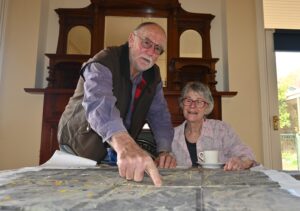
Blackberries were introduced to Victoria’s regional areas — specifically to river banks — in the 1850s by Baron Ferdinand von Mueller, who was the director of Melbourne’s Botanic Gardens and an early conservationist.
Von Mueller carried seeds throughout Victoria and sowed them in the cooled ash of any campfire he lit.
In an irony writ large on his legacy, he believed that poor people would one day “come to bless” him for his thoughtfulness in helping supply wild fruit.
Blackberries can spread on to cleared land from neighbouring stands via seed and Terry believes a community approach is needed to help those farmers bordering infested land with their annual upkeep.
“It’s a social conscience thing.
“The VBT view is that peer group pressure is what overcomes this problem, but for that, you need to have a relationship with your neighbour.
“But when you’ve got 20 properties surrounding one that’s not complying you can understand why people feel a little bit disillusioned.”
Criticism of Agriculture Victoria’s policy with blackberries centres on the measures required by a landholder to comply with blackberry control.
“They’ve made it a pretty easy job.
“If you demonstrate that you’ve sprayed this bush and that bush, then AgVic says you are complying.”
VBT chair Lyn Coulston said new research had suggested that blackberries could be a further biosecurity risk due to them harbouring fruit flies and that the VBT was involved in field surveys into this new threat.
“We are doing a second round of the research because we want to take it a bit further,” Lyn said.
“It looks clear that blackberries are hosting fruit flies and we need to alert people.
“The research might be a way of bringing to people’s attention that their blackberries are having an effect around them more than just seeding on to someone else’s paddock.
“In those fruit growing areas, they are potentially having an impact on orchards.”
The VBT was recently awarded a $40,000 grant from AgVic to help with its programs to assist farmers.
Part of that money helps fund Landcare groups.
Lyn said the money would go towards demonstration field days.
“It allows everyone in the area to come along and have a look to see what they could do with their blackberries.
“We bring experts in to show a range of control methods.
“It could be slashing or wet blade mulching or an organic treatment or spraying different areas of a property.
“There are plenty of alternatives for variable access to the weed.”
Drones have become a more recent and effective tool for spraying and surveying the weed’s presence.
Susan said drones had become a “more attractive” option with one of the Landcare group’s members having bought his own.
“Drones can be programmed, and they can go under trees to do some of the inaccessible spots,” she said.
“It’s still in its infancy and a bit costly at present but it definitely has application in country like this.”
Terry and Susan have welcomed the new funding and believe a more streamlined approach is needed for its application, with four blackberry groups springing up over the years.
“Some action groups can work on their own, but we have chosen to come under the umbrella of Landcare.
“The money comes to Landcare, and so there’s no sense in having a blackberry action group running in parallel with a Landcare group.
“You could use the same executive and same staff and do the same job.
“And it makes sense: you have got a limited number of volunteers in any community and if you draw on others in the community to form a new group, then why would you bother?
“So there’s been a gradual morphing towards Landcare.”
Terry’s thoughts on von Mueller are pragmatic.
“A man before his time, but who had no idea what he would cost generations of farmers in terms of lost productivity due to this noxious weed.”
